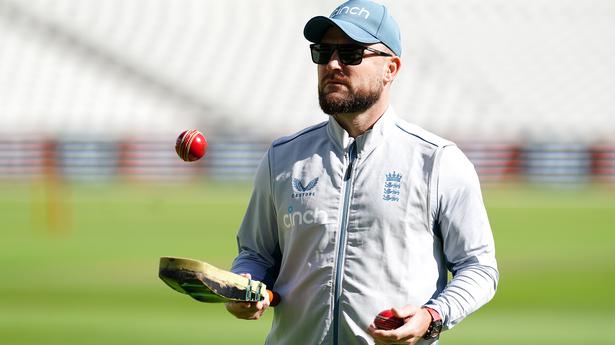The brand of fearless, attacking cricket championed by England Test coach Brendon McCullum has made the world sit up and take notice. Can it be sustained and will others follow suit?
The brand of fearless, attacking cricket championed by England Test coach Brendon McCullum has made the world sit up and take notice. Can it be sustained and will others follow suit?
“Is he for real?”
That, said Matt Prior, was how his teammates reacted when new coach Andy Flower told them that he wanted them to become the first England Test side to be ranked World No. 1, within two years. It was not long after Ian Botham had advised England’s think-tank to head to the Kingston harbour and sink into the deepest channel. The team had been shot out for 51 by the West Indies during the course of a series defeat and was scraping the bottom.
England, at the time, was ranked in the lower half of the ICC Test table. Little wonder the players reacted the way they did when the coach spelt out his goal.
“Is he for real?”
Thirteen years later, England cricketers — and their fans — may be pondering the same question, this time about new Test coach Brendon McCullum. He has been in charge for only four Tests so far, but England has won all of them.
It is the style of those victories that has made the Kiwi the toast of English cricket.
England won chasing in all four Tests (against the reigning world Test champion and then the runner-up). The four chases were among the 13 highest in England’s 145-year history. The highest came against India at Edgbaston last month.
In the Tests against New Zealand, England scored 279 for five at 3.53 runs an over at Lord’s, 299 for five at 5.98 at Trent Bridge and 296 for three at 5.44 at Headingley. India posed a bigger challenge, but it was also met with ridiculous ease — 378 for three at 4.93.
Hot pursuit
Last year, India, forced to play an almost second-string eleven because of injuries, pulled off an even more stunning chase, against Australia at Brisbane. The visitors made 329 for seven at a rate of 3.39 runs per over to end Australia’s unbeaten streak of 32 years at the Gabba.
The final day at Edgbaston may not have provided the thrills, twists and drama experienced at the Gabba — ah, that hook by debutant Washington Sundar off Pat Cummins — but the England top-order came up with one of the most authoritative chases in Test history. To post four wins on the trot, all successful pursuits of targets exceeding 270, is no mean task; it’s unprecedented.
There were doubts, however, even from the staunchest English fans, about whether their team would be able to overpower India the way it did New Zealand, especially after conceding a lead of 132 in the first innings. But those clouds of apprehension began to disappear with the intent shown by the openers, Alex Lees and Zak Crawley.
Few expected Lees and Crawley, with just one fifty between them in seven Test innings this season and neither belonging to the Eoin Morgan school that revolutionised England’s white-ball cricket, to go after the formidable Indian bowling. Fewer expected them to post the fastest hundred for the opening wicket in England’s Test history.
The job may have been finished by Joe Root and Jonny Bairstow, but it was the way the openers batted that tells us more about the brand of Test cricket, termed — embarrassingly so for McCullum — ‘Bazball’ (derived from his nickname Baz).
How significant is this method — which, its critics might argue, borders on madness — for Test cricket, especially at a time when the ICC chairman has warned of a reduction in long-format games in the future? And will other teams try to emulate England?
Dav Whatmore, the former Australia Test batter who went on to become a World Cup-winning coach, thinks others might be tempted. He gives McCullum the credit.
“And he had no experience of coaching a Test side before, did he?” Whatmore tells
McCullum’s arrival in England was as well-timed as the strokes he played in the first innings of his final Test, which remains the fastest hundred in the format. England had lost the previous four series, which included a humiliating 4-0 drubbing in Australia, and the captain, Root, had resigned. Coach Chris Silverwood had stepped down after the Ashes debacle.
Indeed, the situation wasn’t dissimilar to the time Flower took over in 2009, when captain Kevin Pietersen quit and coach Peter Moores was sacked. Under the Zimbabwean, England became the No. 1 Test team two years later.
But the method Flower used to transform the side came in for criticism; he was seen as a hard task-master, who took the players to a boot camp in Bavaria so gruelling that some ribs were broken. McCullum, on the other hand, is reportedly planning an adventure holiday, featuring golf and laidback activities, ahead of the Test series in New Zealand next year.
McCullum was fortunate that he began his job at a time when two England batters, Root and Bairstow, were finding the form of their lives. It was their unbroken fourth-wicket partnerships that took their team home against India and in the final Test against New Zealand.
While Root, more of an orthodox red-ball batter, played the lap shot and the reverse sweep with abandon, it was the ruthlessness of Bairstow’s bat that made the fourth-innings targets look smaller than they actually were. In four Tests, Bairstow averaged 102.33 and had a strike-rate of 100.16. He entertained.
Captain Ben Stokes, who has had a dream start, agrees with McCullum that the entertainment aspect is important. Root said the skipper wants all of them to be rockstars.
It is not that Test batting hasn’t rocked before. Adam Gilchrist and Virender Sehwag finished their long Test careers with strike-rates of above 80. But, their approach wasn’t shared by all of their teammates.
As for McCullum’s approach to Test cricket, it will be interesting to see how it shapes up going forward, especially when England travels. And it has to be noted that the Test pitches so far this summer in England have seemed better to bat on than in the past. It was not just with the bat that England attacked though, but with the ball as well.
Importance of conviction
Sujith Somasunder, former India batter and sports psychologist who is heading education at the National Cricket Academy, feels it takes a lot of conviction to play Test cricket the way England does under McCullum.
“It is much more mental than technical, as sport at the highest level always is, but it is more so in Tests because a game can be lost in a session, and there are 15 of them,” he says. “The decision in high-stakes scenarios may be taken by the coach but it has to percolate through the entire team. The players know it is okay to lose and they will not be blamed and the coach will take the responsibility.”
A couple of weeks after England’s victory against India, Pakistan chased down the 342-run target set by Sri Lanka at Galle in the first Test, though at a relatively sombre run-rate of 2.70. This year there have already been seven instances of a team chasing more than 200 to win a Test, equalling the 2008 record — with five more months remaining.
As India, England and Pakistan have shown, there is glory in a successful chase. We may not see too many repeats of the Roseau Test against the West Indies in 2011, when India settled for a draw to secure the series.
That doesn’t mean a draw isn’t desirable. In fact, there is nothing in sport quite like the last ball being played out, sometimes by No. 11, to save a Test from a lost position.
The fourth innings of a Test match needn’t always be an extension of T20 (the format that has clearly made the modern batter more adventurous). If the England batters need inspiration for Plan B — when they need to bat out time — they won’t have to look beyond their dressing room. McCullum had batted for 775 minutes to save the Wellington Test against India in 2014.
Is he for real?







